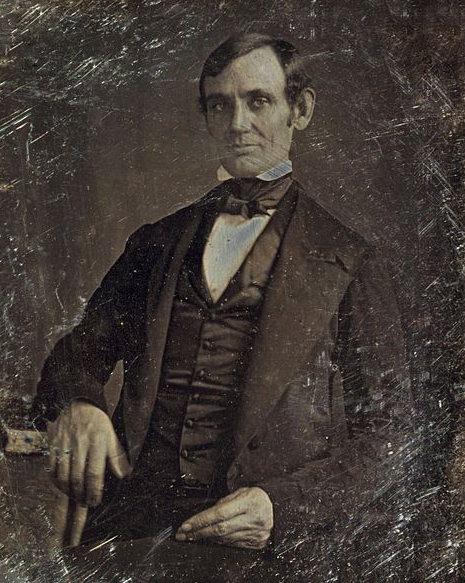
Wikipedia: by Nicholas Shepherd, 1846
What’s a good liberal to do? Try to understand Trump voters’ complexities and engage them, as Nicholas Kristof urges, or denounce them, as Michael Cohen advises? Perhaps Abraham Lincoln can help.
In 1842 the young Lincoln gave his Temperance Address to the Springfield Washington Temperance Society. It wasn’t really about temperance from the drink, but temperance in urging moral reform upon others. The speech was about right and wrong ways to promote moral reform.
Lincoln criticized a certain class of reformers: “Too much denunciation against dram sellers and dram-drinkers was indulged in. This, I think, was both impolitic and unjust. It was impolitic, because, it is not much in the nature of man to be driven to any thing.” Lincoln did not think that our erring brethren would respond well to being vilified “in the thundering tones of anathema and denunciation.” Instead:
Lincoln makes several arguments that the denunciation of the drunkards is also unjust. One contention goes thus:When the conduct of men is designed to be influenced, persuasion, kind, unassuming persuasion, should ever be adopted. It is an old and a true maxim, that a ``drop of honey catches more flies than a gallon of gall.'' So with men. If you would win a man to your cause, first convince him that you are his sincere friend. Therein is a drop of honey that catches his heart, which, say what he will, is the great high road to his reason, and which, when once gained, you will find but little trouble in convincing his judgment of the justice of your cause, if indeed that cause really be a just one.
Another error, as it seems to me, into which the old reformers fell, was, the position that all habitual drunkards were utterly incorrigible, and therefore, must be turned adrift, and damned without remedy, in order that the grace of temperance might abound to the temperate then, and to all mankind some hundred years thereafter. There is in this something so repugnant to humanity, so uncharitable, so cold-blooded and feelingless, that it never did, nor ever can enlist the enthusiasm of a popular cause.
In a speech warning of denouncing others, Lincoln went ahead and did it anyway – censuring those who had self-righteously condemned an entire class of their fellow men. He seemed to favor the drunks:
In my judgment, such of us as have never fallen victims, have been spared more from the absence of appetite, than from any mental or moral superiority over those who have. Indeed, I believe, if we take habitual drunkards as a class, their heads and their hearts will bear an advantageous comparison with those of any other class. There seems ever to have been a proneness in the brilliant, and the warm-blooded, to fall into this vice.
Any consideration one shows to Trump voters need not extend to Trump himself. But perhaps condemnation of Trump voters as a class would be impolitic and unjust. As for we moral reformers, as Lincoln counseled in his Second Inaugural, “let us judge not, that we be not judged”

